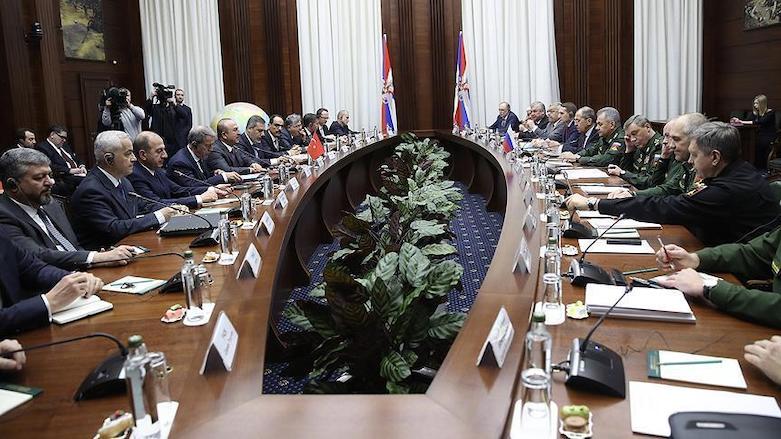High-level Russian, Turkish meeting ends without clear outcome

ERBIL (Kurdistan 24) –Russian and Turkish foreign, defense ministers, intelligence chiefs, and presidential aides met on Saturday without a clear outcome, underlining that they would continue to coordinate their steps in Syria.
Following the meeting, Russian Foreign Minister Sergey Lavrov said “an understanding was reached on how military representatives of Russia and Turkey will continue coordinating their steps ‘on the ground.’”
He added that this coordination would fall “under new conditions with a view to the ultimate eradication of the terrorist threat in the Syrian Arab Republic.”
“Both sides emphasized that all this work will be carried out in strict conformity with UN Security Council Resolution 2254, including unconditional respect for Syria’s sovereignty and territorial integrity,” Lavrov noted.
However, unlike Turkey, Russia does not consider the People’s Protection Units (YPG) as a terrorist organization.
The Syrian government also sees the Turkish military presence as a violation of its sovereignty.
On Wednesday, Russian Foreign Ministry Spokesperson Maria Zakharova said Damascus should control areas under US-control.
“There are meetings, and Turkish demands are being made clear,” Farhad Patiev, a member of the Kurdish National Congress (KNK) based in Russia, told Kurdistan 24.
“The international situation is now helping them,” he continued, in a reference to US President Donald Trump’s decision to withdraw American forces from Syria.
However, he said Turkey would not be able to invade the east of the Euphrates without permission from the United States and Russia.
Turkish officials are expected to visit Washington on Jan. 8, and US National Security Adviser John Bolton has announced he would travel to Turkey in January.
Looking forward to visiting Israel & Turkey in January. We will discuss our continued work confronting security challenges facing allies & partners in the region, including the next phase of the fight against ISIS, as the U.S. begins to bring troops home from Syria.
— John Bolton (@AmbJohnBolton) December 28, 2018
“It seems for Manbij, the US has already given permission, but it also needs Russian permission,” Patiev said.
According to the KNK member, there are rumors that Russia and Turkey might have reached a deal on Manbij. However, he said Russia has not responded to the Turkish demands.
“Russia will listen to the Kurds and what they suggest, and then Russia will make a suggestion,” he added.
Russia previously angered the Kurds when it allowed Turkey to attack Afrin in January after the Kurds refused a full return of the Syrian government to the region.
In a sign of better Kurdish-Russian relations, on Dec. 25, the Russian army returned to Arima and re-established the Russian-Syrian coordination center. This was preceded by talks between the Kurdish-led administrations and officials in Moscow on Dec. 23.
On Friday, the YPG called on the Syrian government to protect Manbij, a step which was welcomed both by Russia and Iran.
So far, the presence of American troops has prevented the Syrian army from establishing points on the Manbij border.
Patiev said it remains unclear if Russia and Turkey would reach any deal as it all depends on “meetings between Russia and representatives of the North and East.”
According to Washington-based Kurdish Affairs analyst Mutlu Civiroglu, the Kurds have no other choice but to talk to Moscow and Damascus to stop a Turkish attack.
“Although Russia earlier gave a green light for the [Turkish] Afrin operation, the circumstances are a bit different now,” he said.
“Russia seems to be [unhappy] with Erdogan’s and Trump’s phone call. Russia was always the main player, but Trump’s decision will strengthen Russia’s position all over Syria.”
Editing by Karzan Sulaivany
